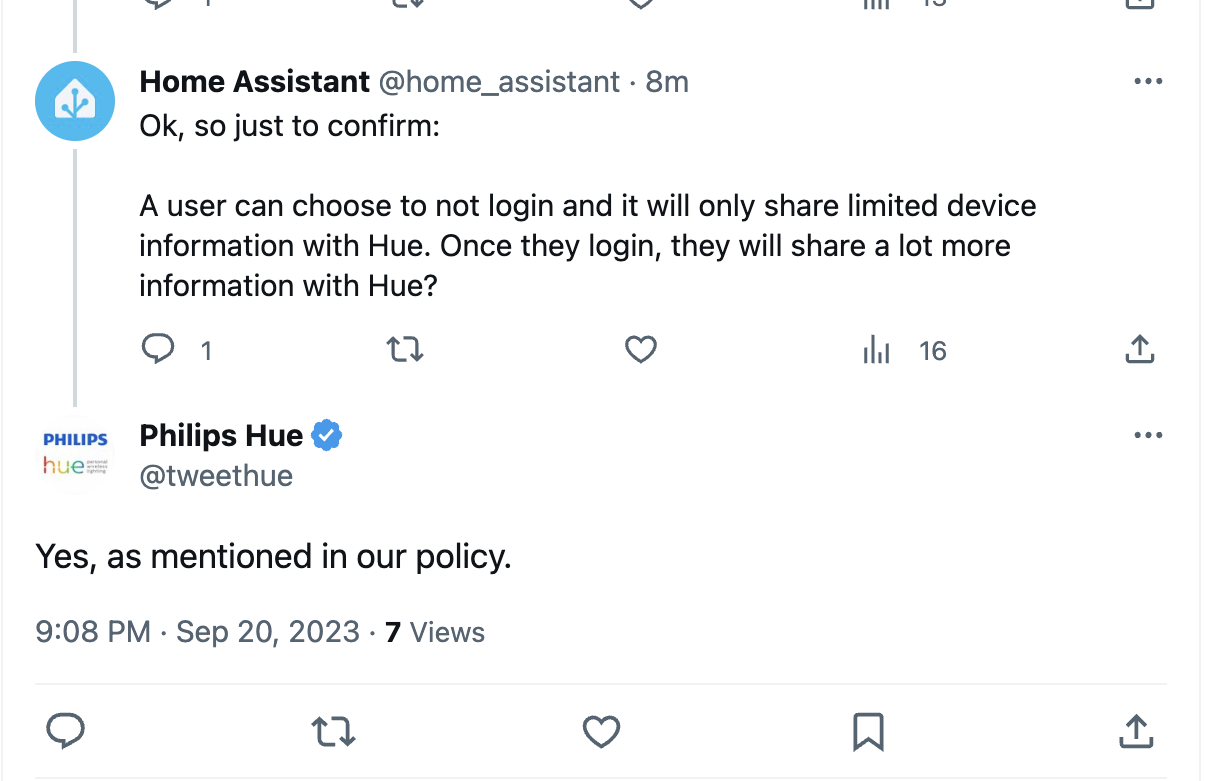cross-posted from: https://lemmy.world/post/5717757
Today’s story is about Philips Hue by Signify. They will soon start forcing accounts on all users and upload user data to their cloud. For now, Signify says you’ll still be able to control your Hue lights locally as you’re currently used to, but we don’t know if this may change in the future. The privacy policy allows them to store the data and share it with partners.



…are you serious?
There would be so much data in understanding people’s light usage. For example, you could figure out how late or early people get up, number of people living in a house, how crowded the house is, how many lights are used per room, etc etc. it would be a gold mine of information.
Let’s say you’re a home automaton designer. You want to design devices to be used in the home, but in order to design such devices, you need enough of a stockpile of user data. This lightbulb data would be incredible valuable.
You can probably even analyse the data and determine things like whether someone is watching tv late at night.
From a nefarious view, how valuable would this data be to robbers and thieves?
also, room names. You can get a pretty good idea of a house’s interior layout from the names and sequence of lights being activated. The ongoing attempts to map data to the physical world.
Sonos did this a few years ago and there was a similar outcry. I have stopped using Sonos devices too.
Oh God, I have an odd sense of humor. I would probably have the cops called on me lol.
Considering a lot of people are home all the time, probably not worth all that much.
I think people overestimate how much their behavior and data is actually worth. Companies only care as far as targeting ads to people. But 95% of the time those ads don’t actually do anything anyways.
You don’t need the individual light bulb data for that, just the user accounts and device IDs would tell you who lives in the house, their relationships, and you can use the IP from the app’s analytics eventing to approximate location to estimate household wealth.
The lightbulb data sounds fun, but not valuable.
How does a randomized system mess with that data. I only have two hue light, an under cabinet strip. My Echo turns them on and off randomly when I set it in the away mode. Will Phillips get both sets of data? Will Daddy Jeff share? Will he just buy Phillips and cut out the middle man?
“I randomize user submitted data to the corporation selling it, how could this possibly be a problem?”
If you’re smart enough to mangle the data you give them, you’re smart enough to understand the issue here.
Get rid of your sunk cost bias and think it through
Maybe they will buy both sets just to confirm the accuracy of the data?
deleted by creator
For example you can be targeted with food ads when you’re likely in the kitchen.
It builds a profile of you, and then they combine that with thousands of other profiles to build demographic profiles and then they sell this data to other firms or use it to further tune their own advertising services.
The same as pretty much every other company on the Internet. If it didn’t work they wouldn’t do it. Some people not understanding this due to over simplified examples makes no difference to that.
That’s not necessarily true, people do things that don’t work all the time, sometimes for a long time. There have been millions if not billions of dollars dumped into shit that doesn’t work. Using charts to predict the stock market doesn’t work, yet you can find people still doing it to this day.
deleted by creator